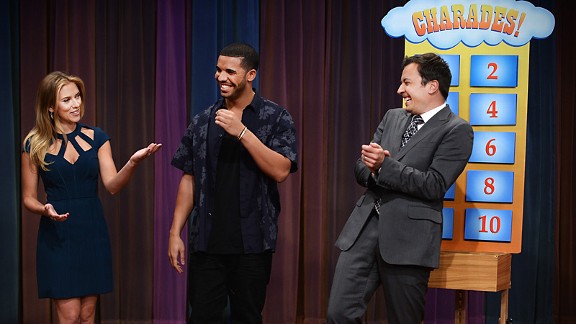
NEILSON BARNARD/GETTY IMAGES
Generation Drake
The Canadian MC becomes the defining millennial hip-hop superstar with Nothing Was the Same
By Steven Hyden on September 18, 2013PRINT
Smart people will disagree on the most Drake-like moment perpetrated by Drake on the Toronto rapper's third studio album, Nothing Was the Same.1 Me, I'm going with "Too Much," the doleful soul-laced ballad he debuted last Friday on Late Night With Jimmy Fallon. Subjects broached in "Too Much" include: Drake's sick mother and her inability to heed Drake's texts; Paul Wall, Bun B, and the significance of the Houston rap scene in Drake's origin story; Drake's uncle Larry Graham and his unacceptable attitude about following his dreams; and Drake's dual status as a dreamer and a believer (which naturally compounds his angst about his uncle, as nobody leaves dreams unattended on Drake's watch).
Toward the end of the first verse, Drake demonstrates why he is the defining rapper of Generation Y. After requesting a back rub from his "main thing," he tells said thing that when he started out nobody wanted him. Now he expects his new record to move a million units in its first week. He started from the bottom and now he's here, only it's not what he expected. "Take a deep breath," she replies. "You're too worried about being the best out."
All of the Drake-iest qualities are represented on "Too Much": the oversharing of familial dirty laundry, the preoccupation with parsing his own (not too distant) past, the self-confidence disguised as self-doubt and self-doubt disguised as self-confidence, and the strident Y-ish striving. The influence of social media is palpable: In "Too Much," Drake simultaneously presents a façade that he knows is not entirely accurate while also acknowledging that this façade is not entirely accurate. (I'm referring to the meta reference to Drake's best-related stress, which, along with phenomena like "yacht envy" and "16-bedroom château guilt," is experienced by only the truly megalomaniacal.) He undercuts this bravado by talking openly about his problems, but he's not fully attached to this identity, either. The "real" Drake is situated somewhere between a self-consciously constructed and self-aware avatar and the handpicked highlights of interpersonal drama he has chosen to share with strangers.
This is the language of tweets, Tumblr posts, and Facebook timelines — the lingua franca of a generation. Drake understands this language intuitively, and Nothing Was the Samewill be most appreciated by those who speak it fluently.
For an album that is expected to position Drake as the top rapper in the game,Nothing Was the Same is highly unusual, if not somewhat perverse. This is to say it's precisely the sort of unexpected left turn that has come to be expected from this black Jewish-Canadian ex–child actor turned MC–slash–semi-competent singer. Like 2011's Take Care, a nocturnal 70-minute mood poem that ranks as one of the most popular and critically respected rap records of the last few years, Nothing Was the Sameoffers little in the way of obvious singles. (The two catchiest tracks, the stalking "Started From the Bottom" and sinewy "Hold On, We're Going Home," were dispatched from the record months in advance.) But Take Care was more varied in its sonic approach and imbued with a seductive musical sophistication that drew in neophytes turned off by Drake's relatively pedestrian radio hits. While Same is similarly constructed as a self-contained, multi-track statement — thoughts left hanging at the end of one song are picked up and expounded upon on the next song — it doesn't have an easy entry point like "Headlines" or "Take Care" that will attract new fans. If Take Care didn't win you over,Nothing Was the Same will seem oppressively opaque.
It might even be a little much for Take Care fans. Musically, Same is practically a Bon Iver record. Working once again with his primary collaborator, Noah "40" Shebib — whose spare, existential soundscapes are as essential to the Drake persona as sweaters andDegrassi — Drake has fashioned Nothing Was the Same into a desolate and deliberately paced listening experience that's a little soft rock even by his well-established softness standards. ("I want to take it deeper than money, p*ssy, vacation / and influence a generation that's lacking in patience," he explains on "From Time," because Drake is edutainment.) That's not necessarily a criticism, since Drake comes off at his most ridiculous when he attempts traditional macho posturing instead of subverting it. (Like on "Worst Behaviour," where Drake awkwardly engages in tough-guy talk like, "bytch, you better have my money when I come for that shyt like O.D.B." This sort of thing just doesn't sound right coming from a guy who spells "behavior" with a u.)
When Drake sticks to more familiar subject matter — his conflicted feelings about women, how they make him feel, and how he feels about how they make him feel — he can be a penetrating lyricist. One of my favorite lines comes from the song "Connect": "She used to say, 'You can be whoever you want, even yourself' / yeah I show up / knowin' exactly who I was and never leave as myself." That's just excellent first-person reportage from the front lines of a toxic relationship.






 . Stay in your place lil homie
. Stay in your place lil homie












